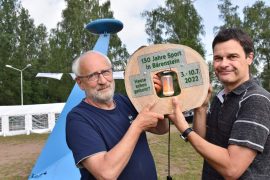Sport cannot prevent dementia. British scientists have now reached this conclusion in a study. Is this why seniors should quit the game?
It is believed to be certain that exercising reduces the risk of engaging in Alzheimer’s or other forms of dementia. Until now, however, it has been controversial whether physical exercise can also slow disease progression.
A research group from Oxford University investigated this question. They found that although exercise enhances the physical fitness of patients with mild to moderate dementia, it does not prevent the disease itself. The decline in cognitive abilities does not “slow down”. The scientists published the results of the study in the British Medical Journal.
No improvement in training program
The study involved 494 dementia patients from England. 329 participated in an exercise program: They took 60- to 90-minute classes at the gym twice a week for four months and were also asked to workout at home for an hour each week.
Participants had an average age of 77 years and were assessed six and twelve months after the start of the program. Doctors found decreased cognitive abilities in both groups. In the group with the exercise program, the values were even worse than in the patients who did not exercise. The difference is small, however, which is why the clinical relevance of the study results is “inconclusive,” stress the researchers.
Difficult to prevent cognitive decline
Brendan Stubbs, a specialist at the Institute of Psychiatry at King’s College in London, tells WebMD that the study results are “extremely important” for the treatment of Alzheimer’s patients. Small previous studies have shown that exercise can prevent or improve symptoms. It is now clear that the search for “effective lifestyle interventions” that prevent cognitive decline must continue.
“The results are in line with current research, which suggests that once dementia is established, it is difficult to modify,” said Dr. Elizabeth Coulthard, Senior Lecturer in Dementia and Neurology at the University of Bristol, UK. “Physical activity still holds promise in delaying the onset of dementia in people at risk of developing the disease,” she told UK media. “Overall, physical activity and healthy aging go hand in hand. However, addressing physical activity as an intervention to improve specific disease processes is challenging.”
According to the World Health Organization (WHO), approximately 50 million people worldwide suffer from dementia. About two-thirds of them have Alzheimer’s. About ten million people are diagnosed with dementia each year.
Important Articles: The information is in no way a substitute for professional advice or treatment by trained and accredited doctors. The contents of T-Online cannot and should not be used to independently diagnose or initiate treatment.

Web guru. Amateur thinker. Unapologetic problem solver. Zombie expert. Hipster-friendly travel geek. Social mediaholic.





